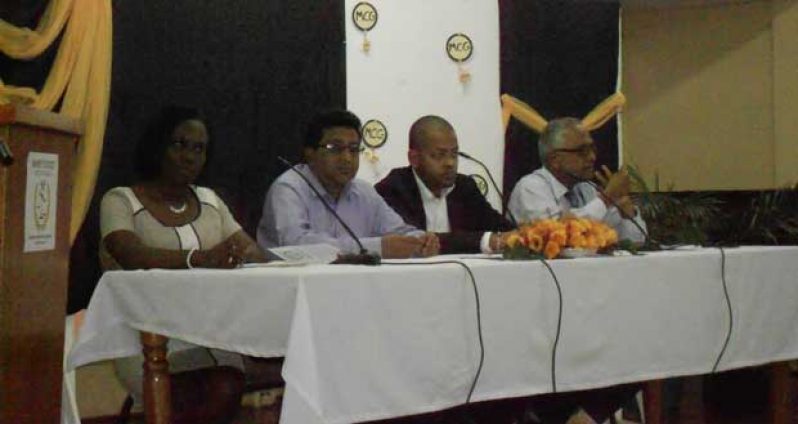— AG Nandlall
FOLLOWING discussions between the Government of Guyana, the Caribbean Community (CARICOM), and the law schools of the Region, the upcoming CARICOM Heads of Government Meeting is set to address the comprehensive reform of legal education in the Region.
Attorney General (AG) and Minister of Legal Affairs, Mr. Anil Nandlall, confirmed this situation during a symposium on the Future of Legal Education in CARICOM, organised by the Mooting Committee of the UG Department of Law under the ambit of Moot Court Guyana (MCG), held on Tuesday at the Education Lecture Theatre (ELT) of the University of Guyana (UG), Greater Georgetown.
The AG commented that holding to the discussions, the second component of the agreement between the entities involved in the discussion, “was a decision taken that the Heads of Government Meeting, which is scheduled to take place on the 2nd July, will discuss the comprehensive review of legal education in the Caribbean.”
“This comprehensive review is intended to address every facet of legal education in the Region,” Minister Nandlall disclosed.
Present at the event were the Attorney-General; President of the Guyana Bar Association, Mr. Ronald Burch-Smith; and Attorney-at-Law, Mr. Christopher Ram. The discussion attracted attention from some of the higher authorities of the University of Guyana, including Vice-Chancellor Professor Jacob Opadeyi; Dean of the Faculty of Social Sciences, Dr. Paloma Mohamed; Professor of Law, Mr. Justice Duke E.E. Pollard; Head of the Department of Law, Mr. Sheldon McDonald; and Attorneys-at-Law, Mr. Teni Housty and Mr. Basil Williams.
The Attorney General, in his remarks, reaffirmed the commitment of the Government of Guyana in establishing a secure future for individuals aspiring to legal education in Guyana.
He recalled that it was the People’s Progressive Party Administration that had brought the Bachelor of Laws (LL.B) programme to the University of Guyana. According to him, students pursuing Law, 25 years before the intervention would complete the first year of legal education at the University of Guyana, and the final two years at the University of the West Indies, Cave Hill campus.
The Legal Affairs Minister underscored that the fundamental challenge to legal education in the Region was the delinquent stance taken by some CARICOM governments in the subsidisation of students attending the Hugh Wooding Law School (HWLS), Norman Manley Law School (NMLS), and the UWI Cave Hill Law School.
He noted that what obtains in the Region is an agreement by governments to pay an economic cost, as half of the total tuition fees for students. And students were required to pay the remaining portion at “a very small, insignificant fee.”
Minister Nandlall bemoaned that some governments have found themselves indebted to the Council for Legal Education (CLE) to the tune of millions of United States dollars. According to him, Guyana had taken a principled position, because of economic constraints, to withhold obligation on paying the subsidised economic costs.
The Attorney General noted that the decision had resulted in Guyana being one of only three Caribbean nations not indebted to the CLE. The other two countries are Jamaica and Trinidad & Tobago.
Nandlall recalled that the question of whether there is a need for more lawyers in the profession has always been one of the topical concerns. The AG stressed that the solution approached by Guyana would be one that takes the best interests of the country and its students into consideration.
“It must be one that will guarantee and assure a quality legal education that is relevant, affordable and accessible…that will make our students understand their role and functions in society…[with] the interconnectivity of all these concepts to the economic and social advancement of our people and our country”, he asserted.
On the question of establishing a law school in Guyana, the Attorney General urged for the system of discussions between the relevant authorities to be allowed to carry its course. He noted that if there is not a solution to the impasse, then establishing a law school in Guyana would not be overlooked.
He said, however, that such a law school ought to be established under the ambit of the CLE, which would not be limited to students from Guyana. He noted that persons from other Caribbean territories must also be able to attend the law school in Guyana as a regional initiative.
“We cannot pursue an agenda that is regarded, or can be construed; or, in fact, will be insular”, he said, also adding: “We will work with the process as far as possible. If we see that the process does not serve our interest, then we will have to be forced to take insular positions; and I’m hoping that we don’t have to resort to those mechanisms.”
The AG’s sentiments were shared by Attorney-at-Law, Mr. Teni Housty, who raised the question whether Guyanese students would want to be limited to practising Law in Guyana. He noted that the question becomes fundamentally important since the support of the CLE would be integral.
Establishing a law school in Guyana which was not undertaken as a regional initiative through the Council for Legal Education would result in Guyana operating a programme which would not be regionally accredited, and would only serve the interest of the Guyanese population.
Head of the Law Department, Mr. Sheldon McDonald, questioned whether the law schools market ought to be liberalised in the Caribbean Community. The HoD was adamant that the CLE should form an accreditation body which would provide acknowledgment to institutions in the Region based on set criteria for establishing such law schools, including sufficient funds and quality research facilities.
(By Derwayne Wills)



.jpg)









